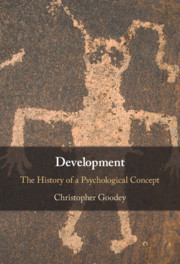Book contents
- Development
- Development
- Copyright page
- Contents
- Acknowledgements
- Introduction
- Chapter 1 Development and the Origin of Psychological Concepts
- Chapter 2 The History of Christianity and the First Principles of Development: Linear Time, Interiority, Structure
- Chapter 3 The History of Education: Rearing the Elect Child
- Chapter 4 Pascal on the Ordering of Human Time
- Chapter 5 The Normalization of the Elect: Locke to Montesquieu
- Chapter 6 The Coining of a Developmental Theory: Leibniz to Bonnet
- Chapter 7 Emile: Rousseau’s Well-Ordered Developer
- Chapter 8 Nature versus Nurture and Cognitive Ability Testing: Historical Sketches
- Postscript Further Targets for Historical Research
- Index
Chapter 4 - Pascal on the Ordering of Human Time
Published online by Cambridge University Press: 10 June 2021
- Development
- Development
- Copyright page
- Contents
- Acknowledgements
- Introduction
- Chapter 1 Development and the Origin of Psychological Concepts
- Chapter 2 The History of Christianity and the First Principles of Development: Linear Time, Interiority, Structure
- Chapter 3 The History of Education: Rearing the Elect Child
- Chapter 4 Pascal on the Ordering of Human Time
- Chapter 5 The Normalization of the Elect: Locke to Montesquieu
- Chapter 6 The Coining of a Developmental Theory: Leibniz to Bonnet
- Chapter 7 Emile: Rousseau’s Well-Ordered Developer
- Chapter 8 Nature versus Nurture and Cognitive Ability Testing: Historical Sketches
- Postscript Further Targets for Historical Research
- Index
Summary
Blaise Pascal’s Pensées hint at a temporal description of soul and mind, and were deeply influential upon subsequent pioneers of the developmental idea. On the one hand, using spatial analogies drawn from geometry, Pascal considered the most important aspect of the individual’s interiority to be ‘Order’. On the other, Order was a temporal phenomenon because it had to manage the movements of interiority over time, which otherwise had a ‘lunatic’ unpredictability. The political theory of absolutism, which Pascal approved, arose in order to control this. Pascal believed it was possible even for the predestined elect to lapse or degenerate, and initiated the focus on time as a ‘counterweight’, a way of pushing back against this. His account of the power of the individual will in relation to God’s operation of that will marks the start of a resemblance to the account of ‘nature versus nurture’ in modern psychobiology.
Keywords
Information
- Type
- Chapter
- Information
- DevelopmentThe History of a Psychological Concept, pp. 85 - 104Publisher: Cambridge University PressPrint publication year: 2021
